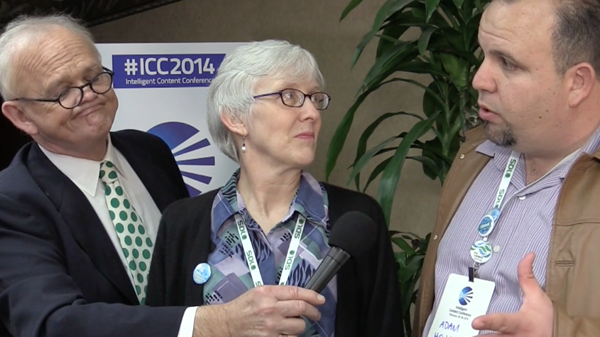Published here first , TechWhirl brings you Marcia’s answers to some questions posed by the organizers of the Intelligent Content Conference held in San Jose in February, 2014.
What was the biggest content moment of the past year, and why?
As I set out to answer this question, I expected to say that the biggest content moment of the past year was the moment—surely it had happened—that ebook sales overtook print-book sales worldwide.
Why did I expect to say that? On May 19, 2011, according to the New York Times, Amazon announced that it had crossed the line and was now selling more ebooks than print books: 105 Kindle books to every 100 print books. The next year, on August 6, 2012, Amazon UK—who knew there were so many Amazons—announced that they, too, according to the BBC News, had crossed the line and were now selling more ebooks than print books: 114 to 100.
Well, Amazon may be big—with a name like that, how could they be small?—but apparently, their stories don’t tell the whole story. When I went looking (Googling, of course) for “the moment,” the big moment when the whole world of books crossed the line, I couldn’t find it.
Instead, I found references to the Pew Research Center’s Internet & American Life Project, which came out just after we flipped our calendars to 2014. I saw reports that summarized the findings as follows:
- “For all the talk about print books being replaced by digital books, the vast majority of readers in the U.S. still consume books the old-fashioned way.”
- “Ebooks are on the rise, but print books rebound and endure.”
So maybe the biggest content moment of the past year was the moment that didn’t happen. Print books did not yield.
What new content technology are you most excited about, and why?
Software that helps people write better—software designed by computational linguists—has huge potential. I had never heard of “computational linguistics” until a few years ago. This field didn’t exist when I was in college. In the 1970s, we could major in computer science, or we could major in language studies. No one I knew majored in both, let alone a hybrid.
Today, computational linguists are creating software, like Acrolinx, that supports writers in making better decisions at the point of writing. What an opportunity for technology to improve writing quality and consistency across an enterprise.
Why are you participating in ICC2014?
I went to my first ICC in 2012 in Palm Springs. What energizing presentations and fascinating people. Ann Rockley and Scott Abel, the conference organizers, had me hooked.
In 2013, it just got better. I couldn’t wait to see who would attend this year and hear what they had to say. I couldn’t imagine Ann and Scott topping their previous Intelligent Content Conferences, but they did. For the ultimate topper, they hired Durwood Fincher, aka Mr. Doubletalk, to punk several of us Candid Camera–style. As evidence of this prank, here’s the video that they played during Fincher’s dastardly closing keynote.

Durwood Fincher (left), Marcia, and Adam Helweh. See the video on Vimeo.
What do you do?
I have run a tech-writing business for … a long time.
In April 2013, a life-long dream came true when I published my book, Word Up! How to Write Powerful Sentences and Paragraphs (And Everything You Build from Them). Creating that book gave me more pleasure than the law should allow. I’m grateful to the many people who contributed ideas and feedback—and, in Scott’s case, the foreword.
It all started when I was twelve. “American Girl” magazine printed my eight-paragraph story, “The Key,” and paid me $15. I’ve been writing ever since.
At Lake Forest College, I wrote one-act plays that were performed on the campus stage, learned from, and buried. Next, I had the privilege of studying under Raymond Carver and Tobias Wolff in the creative-writing program at Syracuse University. Over the years, I’ve been surprised and delighted at how handy those playwriting and story-crafting skills have proven in the work world. Attend any conference for professional communicators today, and count the times presenters use the term story.
Back to my timeline (notice the narrative structure at work here?) … As graduation loomed, I discovered technical writing. Companies would pay me to write! I could pay my bills by explaining how things worked!
Since then, I’ve taught technical writing in the Engineering School at Cornell University, and I’ve done writing of all kinds for organizations of all kinds.
You can find my blog posts, the Word Up! video trailer, and lots of other words on words at www.howtowriteeverything.com.